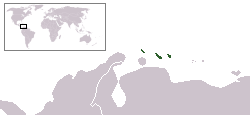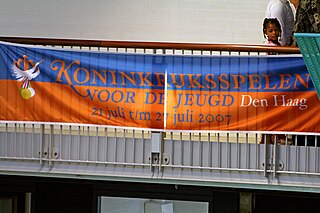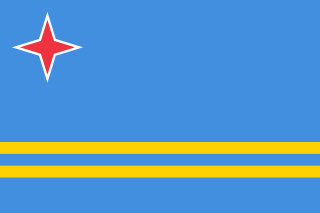
The Netherlands Antilles was a constituent country of the Kingdom of the Netherlands. The country consisted of several island territories located in the Caribbean Sea. The islands were also informally known as the Dutch Antilles. The country came into being in 1954 as the autonomous successor of the Dutch colony of Curaçao and Dependencies, and was dissolved in 2010. The former Dutch colony of Surinam, although it was relatively close by on the continent of South America, did not become part of Netherlands Antilles but became a separate autonomous country in 1954. All the island territories that belonged to the Netherlands Antilles remain part of the kingdom today, although the legal status of each differs. As a group they are still commonly called the Dutch Caribbean, regardless of their legal status.
Aruba's first inhabitants were the Caquetio Indians from the Arawak tribe, who migrated there from Venezuela to escape attacks by the Caribs. Fragments of the earliest known Indian settlements date back to about 1000. Due to Aruba's mostly distant location from other Caribbean islands and strong currents in the sea which made canoe travel to the other islands difficult, the Caquetios remained more tied to South America than the Caribbean.
Defense on Aruba is the responsibility of the Kingdom of the Netherlands. The Netherlands Military forces that protect Aruba include the Royal Netherlands Navy, the Netherlands Marine Corps and the Netherlands Coastguard. There is also a small indigenous "Arubaanse Militie" (ARUMIL) of about platoon strength. All forces are stationed at Marines Barracks Savaneta.

The ABC islands are the three western-most islands of the Leeward Antilles in the Caribbean Sea that lie north of Falcón State, Venezuela. In order alphabetically they are Aruba, Bonaire, and Curaçao. All three islands are part of the Kingdom of the Netherlands, although they remain outside the European Union. Aruba and Curaçao are autonomous, self-governing constituent countries of the Kingdom of the Netherlands, while Bonaire is a special municipality of the Netherlands proper.

Elections in Aruba gives information on election and election results in Aruba.
The Constitution of the Netherlands Antilles was proclaimed on 29 March 1955 by Order-in-Council for the Kingdom. Its proclamation was specifically mandated by article 59(4) of the Charter for the Kingdom of the Netherlands, which had been enacted on 15 December 1954. Together with the Island Regulation of the Netherlands Antilles, the Constitution describes the foundation of the government of the Netherlands Antilles.
Same-sex marriages are not performed in Aruba, Curaçao, or Sint Maarten, which are constituent countries of the Kingdom of the Netherlands. The islands were, however, obliged after several court rulings to register any marriage registered in the Kingdom, but they don't have to give same-sex marriages the same legal effect as opposite-sex marriages. As marriage in the European territory of the Netherlands, as well as in the Caribbean Netherlands is open to any two people, marriages performed there have to be registered in the islands.

The Charter for the Kingdom of the Netherlands describes the political relationship between the four countries that constitute the Kingdom of the Netherlands: Aruba, Curaçao, and Sint Maarten in the Caribbean and the Netherlands in Europe. It is the leading legal document of the Kingdom. The Constitution of the Netherlands and the Basic Laws of the three other countries are legally subordinate to the Charter.

The Netherlands Antilles was an autonomous Caribbean country within the Kingdom of the Netherlands. It was dissolved on 10 October 2010.

The Kingdom Games were a multi-sport event that was held every two years between the youth of the countries that were part of the Kingdom of the Netherlands. At the final edition in 2009, these countries were the Netherlands, the Netherlands Antilles and Aruba. The 2010 dissolution of the Netherlands Antilles led to the cancellation of the 2011 and 2013 editions of the Games, and ultimately the Games were discontinued in 2014.

The following outline is provided as an overview of and introduction to Aruba:

A common visa exists since the end of 2010 for the territories of Aruba, Curaçao, Sint Maarten and the Caribbean Netherlands which form together the territory of the Kingdom of the Netherlands in the Caribbean. The visa is not valid for the European part of the Netherlands, which is part of the Schengen Area.

The Dutch Caribbean are the territories, colonies, and countries, both former and current, of the Dutch Empire and the Kingdom of the Netherlands that are located in the Lesser Antilles archipelago of the Caribbean Sea.
An island council was the governing body of an island territory, an administrative level of the Netherlands Antilles until its dissolution.

An independence referendum was held in Aruba on 25 March 1977. In 1976 the Estates had approved a referendum on the island's status. Voters were given the choice of independence or remaining in the Netherlands Antilles, with over 95% voting in favour of the former. In 1983 the Treaty of The Hague agreed independence for Aruba by 1996, and the island seceded from the Netherlands Antilles in 1986. However, in 1994 the plan for full independence was scrapped.

Dominico Felipe "Don" Martina is a Curaçaoan politician. He served two terms as Prime Minister of the Netherlands Antilles. His first term lasted from November 1979 to October 1984 and his second term from January 1986 to July 1988.

General elections were held in Aruba in June 1951. They were the first elections for the Island Council, and followed the establishment of the Island Councils of the Netherlands Antilles through the Islands Regulation of the Netherlands Antilles (ERNA).








